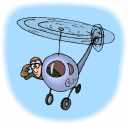
Teacher as Consultant
Reflecting about classroom management in metaphorical terms can be helpful. Fay and Cline (1990) use metaphors to describe the degree to which teachers and parents foster responsibility in young people. A "helicopter" is someone who is overprotective of children. Helicopters hover over youngsters, ready to rescue them as soon as a mistake is impending: "Danny, remember your coat. It is cold out today."

In contrast to helicopters, "drill sergeants" boss children around. Drill sergeants use fear and embarrassment to prevent children from making mistakes: "Danny, I told you it was cold out. Why did you leave your jacket in the classroom? Maybe next time you will listen to me"! Although the means used by helicopters and drill sergeants are different, the underlying message is the same: "You cannot make it in life without me. I need to think for you."

Unlike helicopters and drill sergeants, teachers and parents who operate as "consultants" foster thinking in children. Children are caused to think when adults refrain from making decisions for them. Instead, children can decide from viable alternatives posed by adults: "Danny, do you want a jacket, or do you think your shirt is sufficient"? When youngsters make mistakes, consultants empathize with them, rather than judge their decisions. In this manner, children may grow in confidence as they realize that adults are willing to entrust some decisions to them.

Most probably, the role of a teacher is not characterized by the same metaphor all the time--nor should it be. Instead, teachers need to determine how much freedom to give students to make decisions based on safety concerns, time available, and developmental level. In addition, teachers need to determine who "owns" a particular problem. In general, a child owns a problem and should, therefore, solve it when that child is the only one affected by the outcome. A student's decision to wear or not wear a coat does not affect the teacher or other classmates. That student has an opportunity to learn from the natural consequence of getting cold. (I am not suggesting leaving the decision to the student when the wind chill is 60 degrees below zero!) On the other hand, a student who throws scissors in the classroom is not the only one who may be injured. Therefore, the teacher needs to decide what is safe and unsafe on behalf of the class. Teachers, may God grant us wisdom as we reflect on our management role in metaphorical terms, and may we foster responsibility among students by determining when they do and do not own classroom problems.
Cline, F., & Fay, J. (1990). Parenting with love and logic: Teaching children responsibility. Colorado Springs, Pinon Press.
© Steven A. Henkel, 12/02
| Other metaphors | Management ideas | Home |